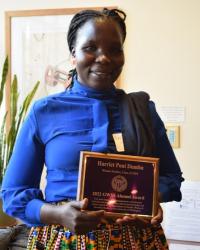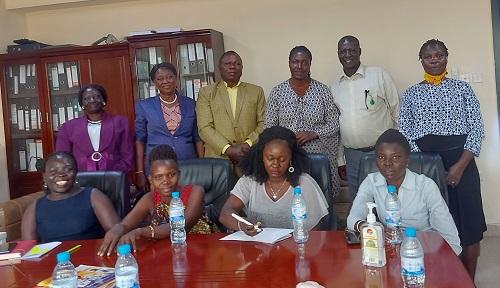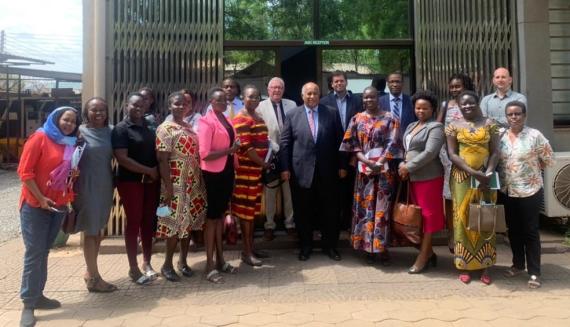During the GWSS Fall Reception on October 5, 2022, Harriet Dumba, who earned her Bachelor of Arts in Women Studies in 2004, received the 2022 GWSS Alumni Award. As the Executive Director of Women Partners for Health (WOPAH) in South Sudan, Harriet happened to be in the United States at the time and her parents Cathleen and Larry Scott flew her to Seattle, Washington to attend the reception and accept the award.

Before the reception, Harriet sat down with a GWSS student to share her past journey in the department, her career after graduation, and advice for current GWSS students (watch the interview).
Growing up in South Sudan, Harriet cultivated a passion to learn about and make changes around women’s rights. “As a child, I grew up putting in my mind that I really wanted to make a change. And that change has to involve women mostly because we do believe that as women, when educated, the entire community benefits and knowledge is shared and we raise healthy children and healthy families.”
After moving to the United States in her teenage years, Harriet went to Garfield High School and then attended the University of Washington. She first learned about GWSS, or Women Studies at that time, through freshman orientation. The title of the department immediately drew her interest because it aligned with her passion for women’s rights. “When I looked more into the classes, I really fell in love [with the department] because I had very, very great mentors in the department… I really felt at home in the department. I have a lot of heroes in this department. For example, Professor Angela Ginorio, to mention a few, played a key role in my life.” During GWSS classes, Harriet learned about different feminist social movements around the globe, which inspired and motivated her to enter the field of activism. “I learned so much about women in the world and how they changed the ways things were… That really encouraged me and empowered me.” In 2007 Harriet earned her Master of Public Health at UW.
After graduating from college, Harriet made a bold yet affirmative decision to base her activist career in South Sudan to continue pursuing her passion despite the fact that many of her friends live in the U.S. and the uncertain situation in South Sudan. Harriet sees her activism as “passing on the love [she] learned from the departments.” “I think that my degrees play a great key role in what I do because I am able to refer back to the knowledge I gained from the departments to push me forward and help me to do the work that I'm doing right now in South Sudan, working in gender equity (women and girls), and empowering them as future leaders. ” I do my best and where I end another will pick from there and someday the road will be smoother with fewer thorns”.
She co-founded the Southern Sudanese Women’s Association, which was a non-profit organization that connected refugees from South Sudan in the United States and helped them settle into their new lives. Later, to focus more centrally on health issues in South Sudan, she co-founded a second non-profit organization, Hearts of Angels for Health-Sudan Initiative, specifically targeting HIV/AIDS. To learn more about Harriet’s activism work, please read: A Dynamic Duo Helps Sudanese Locally and Abroad (UW Perspectives, 2009).

Among many of her impactful achievements, Harriet shared at the GWSS fall reception that she took the most pride in pushing for the 35% Affirmative Action policy for women’s political participation in South Sudan, which was first an SPLM (Sudanese People’s Liberation Movement) party policy and has since been adopted as a national government policy. Her current project is the BrightStar Girls Academy Foundation, which plans to build BrightStar girls' primary and secondary schools in South Sudan and provide more education opportunities for South Sudanese girls. “The percentage of women who are really educated [in South Sudan] is not so high. So the challenge became how do you encourage someone who is in a culture where you feel like your work is just in the kitchen. Just growing up and waiting to be married off. How do you encourage that person to see she can look beyond that?... As a woman, I do come from that culture and I understand the complexity of it. Someone encouraged me to look beyond, and I did that. So I must also encourage someone to [look beyond it]. ”

Lastly, Harriet also gave suggestions for current GWSS students who are worried about the transition from academia to an early career in the “real-world” setting and how to apply their knowledge. “I don’t think there is anything that you cannot apply once you’ve learned it…everything is applicable. Students should look back to what brought them into this department, think about what they want to do with the degree, and then how far they want to go with it. That would bring you closer to where your passion is.” Harriet shared that even though she was initially interested in pharmacy, she later found out that her passion was in bringing community change. “When I actually enrolled in this program, I felt at peace ‘cause what I was learning was really becoming a reality for me.” The knowledge Harriet gained from GWSS classrooms helped her to bring her passion into reality through her impressive activist career.
“If your passion is about working to bring change, then, of course, you are at the right place. How do you do that? There are many areas where you can exercise that. Look at the gaps in the world…There is so much work for us to do out there.”
Story Credit: Simona Liao, GWSS Communications Intern